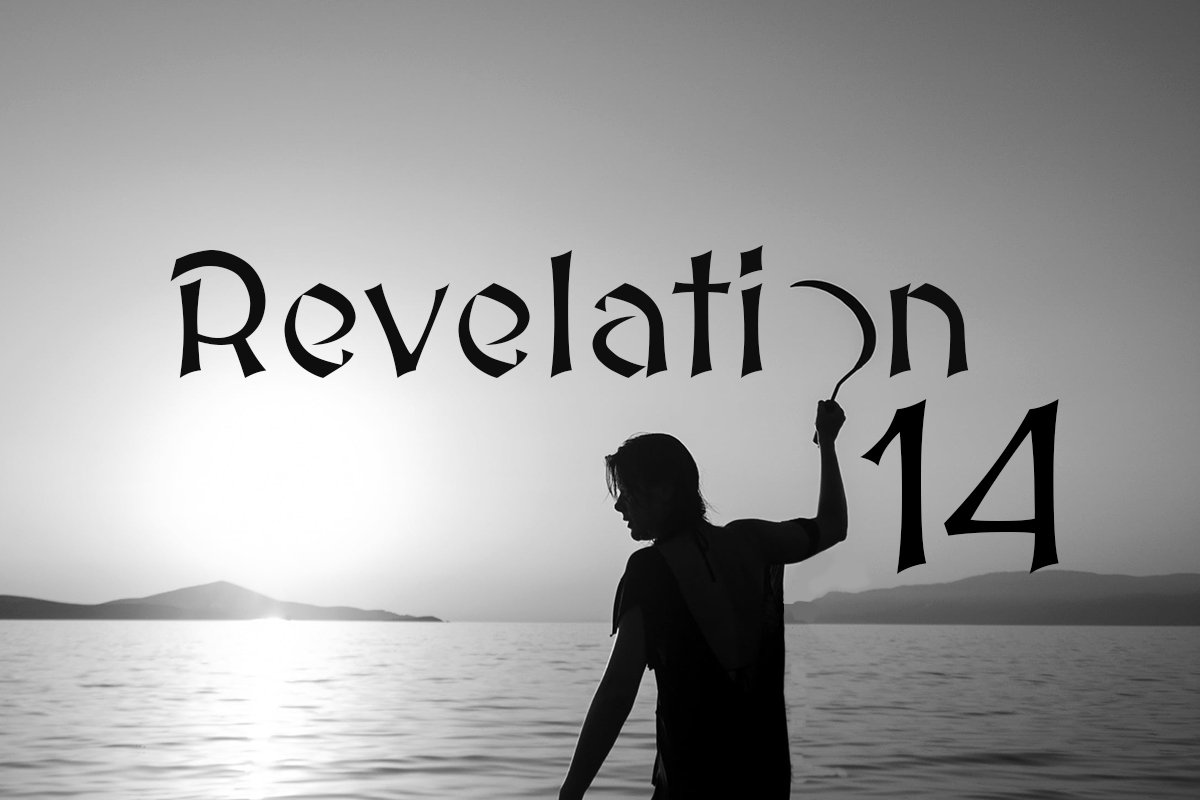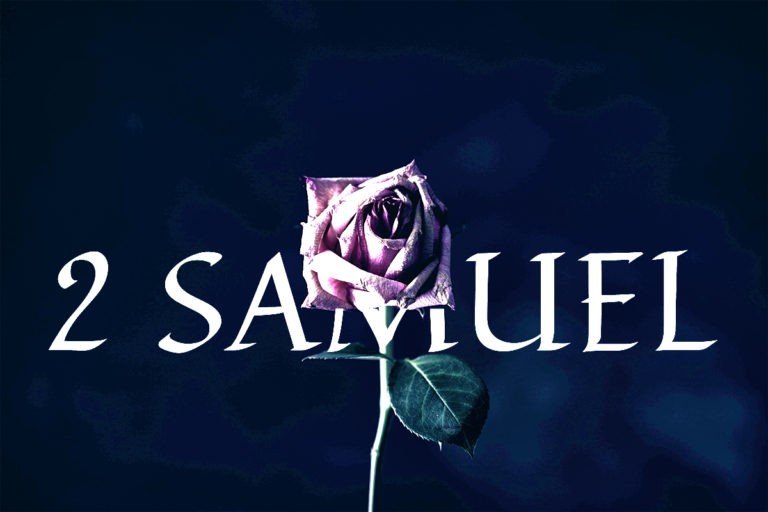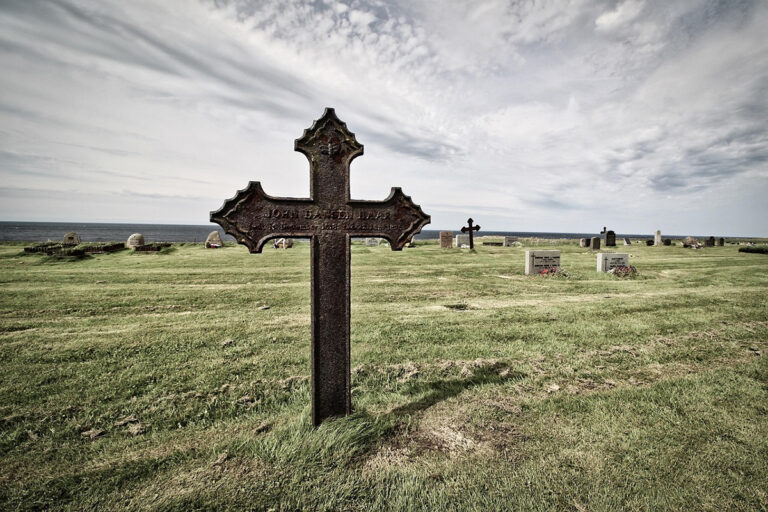Revelation 14 (Listen)
The Lamb and the 144,000
14:1 Then I looked, and behold, on Mount Zion stood the Lamb, and with him 144,000 who had his name and his Father’s name written on their foreheads. 2 And I heard a voice from heaven like the roar of many waters and like the sound of loud thunder. The voice I heard was like the sound of harpists playing on their harps, 3 and they were singing a new song before the throne and before the four living creatures and before the elders. No one could learn that song except the 144,000 who had been redeemed from the earth. 4 It is these who have not defiled themselves with women, for they are virgins. It is these who follow the Lamb wherever he goes. These have been redeemed from mankind as firstfruits for God and the Lamb, 5 and in their mouth no lie was found, for they are blameless.
The Messages of the Three Angels
6 Then I saw another angel flying directly overhead, with an eternal gospel to proclaim to those who dwell on earth, to every nation and tribe and language and people. 7 And he said with a loud voice, “Fear God and give him glory, because the hour of his judgment has come, and worship him who made heaven and earth, the sea and the springs of water.”
8 Another angel, a second, followed, saying, “Fallen, fallen is Babylon the great, she who made all nations drink the wine of the passion1 of her sexual immorality.”
9 And another angel, a third, followed them, saying with a loud voice, “If anyone worships the beast and its image and receives a mark on his forehead or on his hand, 10 he also will drink the wine of God’s wrath, poured full strength into the cup of his anger, and he will be tormented with fire and sulfur in the presence of the holy angels and in the presence of the Lamb. 11 And the smoke of their torment goes up forever and ever, and they have no rest, day or night, these worshipers of the beast and its image, and whoever receives the mark of its name.”
12 Here is a call for the endurance of the saints, those who keep the commandments of God and their faith in Jesus.2
13 And I heard a voice from heaven saying, “Write this: Blessed are the dead who die in the Lord from now on.” “Blessed indeed,” says the Spirit, “that they may rest from their labors, for their deeds follow them!”
The Harvest of the Earth
14 Then I looked, and behold, a white cloud, and seated on the cloud one like a son of man, with a golden crown on his head, and a sharp sickle in his hand. 15 And another angel came out of the temple, calling with a loud voice to him who sat on the cloud, “Put in your sickle, and reap, for the hour to reap has come, for the harvest of the earth is fully ripe.” 16 So he who sat on the cloud swung his sickle across the earth, and the earth was reaped.
17 Then another angel came out of the temple in heaven, and he too had a sharp sickle. 18 And another angel came out from the altar, the angel who has authority over the fire, and he called with a loud voice to the one who had the sharp sickle, “Put in your sickle and gather the clusters from the vine of the earth, for its grapes are ripe.” 19 So the angel swung his sickle across the earth and gathered the grape harvest of the earth and threw it into the great winepress of the wrath of God. 20 And the winepress was trodden outside the city, and blood flowed from the winepress, as high as a horse’s bridle, for 1,600 stadia.3
Footnotes
[1] 14:8
[2] 14:12
[3] 14:20
(ESV)
Revelation 14 Commentary
by Brad Boyles
First question I asked myself… who is Babylon?
John, again, is writing symbolically here. Literal Babylon was a mere fraction of what it had been in years past. But, the wording certainly plays into the analogy, otherwise, why use the name Babylon? Let’s go all the way back to Genesis 11. Remember the Tower of Babel? Babel is the Hebrew word for Babylon. Humanity said, “Come, let us build ourselves a city, and a tower whose top is in the heavens; let us make a name for ourselves.”
So, we have this idea of humanism that manifests itself from our sinful uprising. It is rebellion against God, or, more specifically, this idea of self-sufficiency. They literally wanted to build themselves up to exalt themselves over God in the Heavens.
As the New International Commentary writes, “It is a symbol of the spirit of godlessness that in every age lures people away from the worship of the Creator. It is “the dark counterpart of Jerusalem,” the final manifestation of “secular humanism.”
In Revelation 17 there is an interpretation offered for this woman given the immediate context of John’s readers.
The woman was arrayed in purple and scarlet, and adorned with gold and jewels and pearls, holding in her hand a golden cup full of abominations and the impurities of her sexual immorality. 5 And on her forehead was written a name of mystery: “Babylon the great, mother of prostitutes and of earth’s abominations.” 6 And I saw the woman, drunk with the blood of the saints, the blood of the martyrs of Jesus. When I saw her, I marveled greatly.
7 But the angel said to me, “Why do you marvel? I will tell you the mystery of the woman, and of the beast with seven heads and ten horns that carries her. 8 The beast that you saw was, and is not, and is about to rise from the bottomless pit and go to destruction. And the dwellers on earth whose names have not been written in the book of life from the foundation of the world will marvel to see the beast, because it was and is not and is to come. 9 This calls for a mind with wisdom: the seven heads are seven mountains on which the woman is seated;
Revelation 17:4-9 ESV
Let’s look specifically at the seven mountains on which the woman was seated. This is most certainly a veiled reference to Rome, which was known at that time as the city on seven hills.
We also see something else. In the Bible, women are often used metaphorically to describe a church, or a bride. Last week we read about the 144,000 who were like virgins because of their spiritual abstinence to Jesus. But the woman described in Revelation 14 is not Jesus’ church who partakes in holy communion consuming what represents Christ’s blood and body. This is a church of the enemy that is drunk off the blood of martyred believers and who is responsible for leading others into sexual immorality as well. It is spiritual adultery with someone or something other than God. Once again, this is all about worship.
I cannot stress this enough, the picture being painted by John is a picture of accountability for who you have given your life over to spiritually-speaking. Who or what have you worshiped? This is clear in the following verses.
And another angel, a third, followed them, saying with a loud voice, “If anyone worships the beast and its image and receives a mark on his forehead or on his hand, [10] he also will drink the wine of God’s wrath, poured full strength into the cup of his anger, and he will be tormented with fire and sulfur in the presence of the holy angels and in the presence of the Lamb. [11] And the smoke of their torment goes up forever and ever, and they have no rest, day or night, these worshipers of the beast and its image, and whoever receives the mark of its name.”
Revelation 14:9-11 ESV
Worship and mark. We already know that rebellion against God sends people to Hell. That is a consistent message in Scripture. So, it is reasonable to assume that the mark is not what sends you to Hell. The mark is simply an identifier for those who have already chosen Hell by their actions and lifestyle. Again, let us recall the tower of Babel.
“Let us build for ourselves a city. Let us make a name for ourselves. Let us ascend all the way up to the heavens.” It is the pitch-black anti-Gospel of Babylon.
John is giving fair warning to those claiming to be believers and it should resonate with us today. Who are we serving with our lives? What are we passionate about? Are we motivated and energized by serving ourselves or by serving others?
The slippery slope is temptation which leads to compromise which then leads to rebellion and eventually to a soul that is so self-absorbed and consumed with the world that the ways of God seem completely foreign and outdated, and the mark of the beast seems logical. Is this not a picture of what we are seeing unfold right before our very eyes today?
Swing The Sickle
There is so much symbolism here. It seems the one seated on the cloud, looking like a son of man, adorning a gold crown, and swinging the sickle must certainly be Jesus. Just like the parable of the wheat and the tares, King Jesus gathers and separates both.
So when the plants came up and bore grain, then the weeds appeared also. 27 And the servants of the master of the house came and said to him, ‘Master, did you not sow good seed in your field? How then does it have weeds?’ 28 He said to them, ‘An enemy has done this.’ So the servants said to him, ‘Then do you want us to go and gather them?’
29 But he said, ‘No, lest in gathering the weeds you root up the wheat along with them. 30 Let both grow together until the harvest, and at harvest time I will tell the reapers, Gather the weeds first and bind them in bundles to be burned, but gather the wheat into my barn.'”
Matthew 13:26-30 ESV
But we see an angel appear for the final judgment with another sharp sickle.
Then another angel came out of the temple in heaven, and he too had a sharp sickle. 18 And another angel came out from the altar, the angel who has authority over the fire, and he called with a loud voice to the one who had the sharp sickle, “Put in your sickle and gather the clusters from the vine of the earth, for its grapes are ripe.” 19 So the angel swung his sickle across the earth and gathered the grape harvest of the earth and threw it into the great winepress of the wrath of God. 20 And the winepress was trodden outside the city, and blood flowed from the winepress, as high as a horse’s bridle, for 1,600 stadia.
Revelation 14:17-20 ESV
Again, just like the parable of the wheat and the tares, it seems that Jesus is the One to gather, separate, and bundle the tares in preparation for the fire. Here, the angel is said to have authority over the fire, and John includes another curious detail. The angel appears from beneath the altar. Is this the same place (Revelation 6) where the prayers of God’s people cried out in desperation, how much longer?
Imagine what it will be like when one day when Jesus swipes His sickle and liberates His children to His side and at the same time binds up all of those who have rejected and slandered His Name. The wheat will be spared and the chaff will be burned.
Much is left to the imagination here in Revelation 14, but this we do know with absolute certainty. Jesus will appear in the fullness of His glory and with all authority granted to Him by God. He will do exactly as He promised, separating the sheep from the goats. The most frightening part of Revelation is not the dragon, the beasts, or the utter destruction of mankind. That’s temporary. The most sobering part is the fact that Jesus holds in His Hand your eternal destiny because He will stand before you as judge and jury.
The second part we know with certainty; the judgment of Jesus is not a slap on the wrist. John devotes a specific amount of ink to this horror show of bloody carnage and he tells all of it in graphic detail. There’s a reason for that. Jesus said it would be better for someone like this to have a millstone tied around his neck and get thrown in the sea. It’s not a scare tactic. It’s simply a description of how deathly serious Jesus is about His own personal sacrifice given with unconditional love. So, how seriously are we taking Jesus these days?







